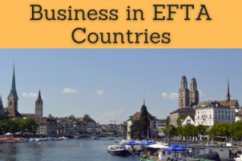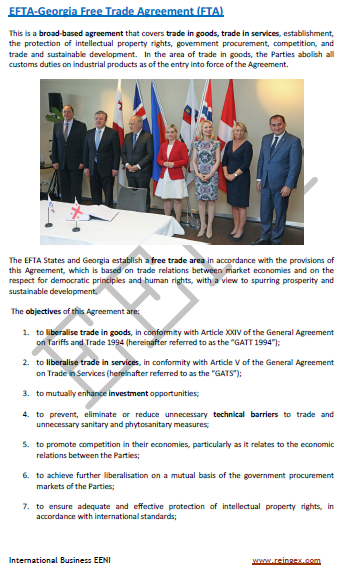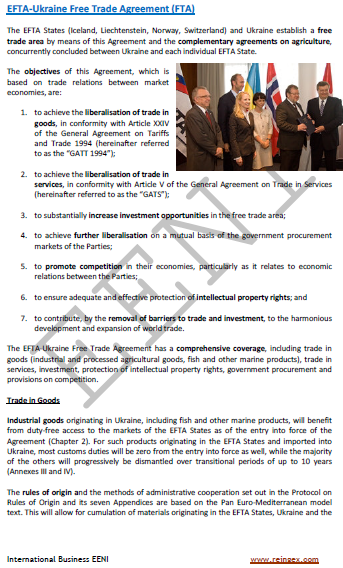Business in Iceland, Reykjavík. Icelandic Economy
Icelandic Foreign Trade. Iceland: market economy, excellent Welfare State

The Republic of Iceland is a market economy with an excellent Welfare State (Universal health care and free higher education)
Aluminum casting is also outstanding, with three factories
Iceland is the smallest economy of OECD member countries
- Introduction to the Republic of Iceland (Europe, EFTA)
- Icelandic Economy
- Doing Business in Reykjavík
- Icelandic International Trade
- Access to the Icelandic Market
- Business Plan for Iceland

The educational aims of the Subject “Foreign Trade, Logistics and Business in Iceland” are:
- To analyze the Icelandic Economy, Logistics and Foreign Trade
- To conduct research on business opportunities in the Icelandic Market
- To research the trade relations of Iceland with the student's country
- To learn about Icelandic Trade Agreements
- To develop a business plan for the Icelandic Market
Sample:

The Subject “Foreign Trade, Logistics and Business in Iceland” is included within the curriculum of the following academic programs at EENI Global Business School:
Masters: International Business, Foreign Trade.


Languages:  +
+  Islandia
Islandia  Islande
Islande  Islândia.
Islândia.
 Masters adapted to Icelandic Students.
Masters adapted to Icelandic Students.
- Subject Credits “Doing Business in Iceland”: 1

International Trade, Logistics and Business in Iceland

Icelandic Preferential Access and Trade Agreements:
- Iceland and the European Economic Area
-
EFTA
- Iceland as a member of EFTA has trade agreements with Macedonia, Albania, Mexico, Montenegro, Bosnia and Herzegovina, Colombia, Georgia, Peru, Chile, Egypt, Tunisia etc
- UK-Norway-Iceland Agreement
- Iceland-China Agreement
- Iceland-Faroe Islands Free Trade and Economic Integration Agreement
- Council of the Baltic Sea States

- World Trade Organization (WTO)
- Agreement on Trade in Services (GATS)
- Agreement on Sanitary Measures
- Agreement on Technical Barriers to Trade
- Agreement on Preshipment Inspection
- Agreement on Safeguards
- Trade Facilitation Agreement
- World Customs Organization (WCO)
- Kyoto Convention
- BIC
- Chicago Convention (ICAO)
- International Maritime Organization
- Istanbul Convention - not a member
- International Chamber of Commerce
- CMR Convention
- Customs Convention on Containers - not a member

European Organizations:
- Organization for Security and Cooperation in Europe (OSCE)
- European Investment Bank
- European Bank for Reconstruction and Development (EBRD)
- Economic Commission for Europe
Global Organizations:
- OECD
- OECD anti-corruption measures
- United Nations
- World Bank
- World Trade Organization (WTO)
- International Monetary Fund
The Republic of Iceland (Europe).
- Official Language of Iceland: Icelandic
- Icelandic Area: 103,000 km²
- Icelandic Population: 323,002 people
- Type of Government: Parliamentary Republic
- Independence of Iceland: 1944 (Norway)
Religion in Iceland: Christianity Protestant Lutheran
Iceland belongs to the European Economic Area.
Icelandic Economy.
- Currency: Icelandic króna
- Taxes in Iceland are quite small compared to other OECD countries
- Iceland lacks natural resources but has a lot of hydropower (the first country in the world of electricity per capita produce) and geothermal
- State intervention is quite strong, especially in agriculture
- Tourism sector represents 3% of the Icelandic GDP

Icelandic Foreign Trade
- Icelandic fishing industry accounts for 40% of its exports
- Main Icelandic exports are fish, marine products, aluminum and ferrosilicon
- Top Icelandic exports destinations are Netherlands (37%), the UK, Spain, Germany
- Main Icelandic imports are machinery and equipment, petroleum products, food products, textiles
- Main suppliers of Iceland are Norway (16%), the United States, Germany, China, Brazil, Denmark
Sample:
(c) EENI Global Business School (1995-2025)
Top of this page









 WhatsApp
WhatsApp